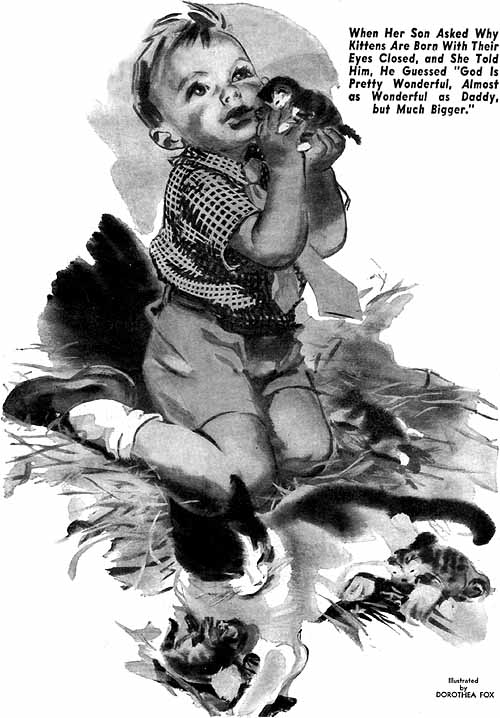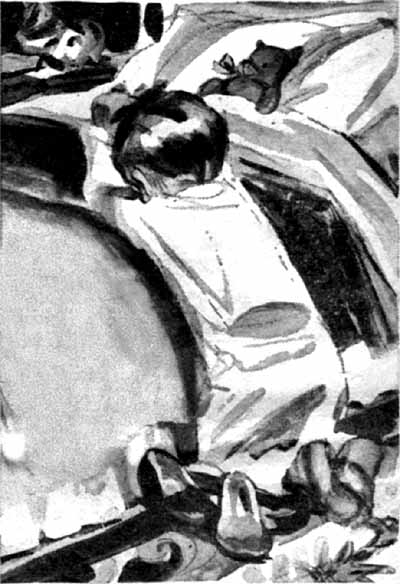
|
Copyrighted Material -CLICK for information |
|
Back |
by
Sarah McMahon
The author tells how her parents wrote their own 10 Commandments, but when her child began to ask questions, she looked to God for the answers.

Dorothea Fox, "I Was an Atheist's Child" American Weekly (1949)
American Weekly ran a series of articles called "My Faith," which were collected into "The Faith of Great Scientists" (Albert Einstein, Robert Millikan, Kirtley Mather, Karl T. Compton, and others). But American Weekly also addressed the faith (or lack thereof) of the Every Man. The article below is one example. Written over half-a century ago, it still speaks with truth today.
© 1949 Heast Publishing Co., Inc. Among the hundreds of communications received in response to “The Atheists’ Child,” which appeared in The American Weekly last Dec. 26, was one from a woman who asked if she could relate her own experience with the problems of irreligion. This moving story was the result. The writing is hers. The name is not. She used a pseudonym in deference to the parents whose beliefs she respects regardless of how much she may now disagree.
By Sarah McMahan
When I opened the pages of The American Weekly some time ago and read the story of little Terry McCollum, whose unbelieving parents scorned God and drove religion from the schools of Champaign, Ill, I felt a deep compassion for this unfortunate child.
I, too, was an atheist’s child, although my parents considered that religion -- or the lack of it -- was the private affair of each individual. They would never have dreamed of interfering with the rights and wishes of others as did Terry’s mother, Mrs. Vashti McCollum. It was her protest against religion in schools which won the support of the United States Supreme Court and threw a troublesome shadow over the right to bring God into the classroom.
I was far luckier than the McCollum boy. At least I was given a code of ethics, a sense of values and a philosophy for living which helped to prop up my own beginnings as a doubter of all things religious.
Let me uncover for you -- as I lived It -- the past history of an atheist’s child. But first let me list for you the substitute “commandments” that were intended to make my living in today’s world endurable and pleasurable. I was taught:
1. That there is no God; that God was man-invented, created in the image of himself; that the proof lies in the dreadful things which happen to the world of men and to individual persons, because of man’s cruelty to his own kind.
2. That mankind has erected, stimulated by its own instincts for self-preservation, a system of society in which the rights of property and inheritance are paramount, and that civilized mankind, in protecting itself, ostracizes and uses religion against the woman who sins.
3. That a democratic form of government such as ours is the best type of government, for it does not conflict with human nature, that to be free means to be able to do what you want to do as long as you do not injure others, and that when you let government help you, you let government control you.
4. That there is no such thing as “sin”—it is a theory invented by man to frighten other men; that the Ten Commandments were merely social laws written by Moses, who claimed they were God-inspired to impress the Israelites who used them to establish order among people wandering in the desert.
5. That the Golden Rule, “Do unto others as ye would have them do unto you,” merely makes life more pleasant and endurable for yourself and for those with whom you live.
6. That profanity and vulgarity are bad manners, denoting a lack of self-respect.
7. That religion is a crutch for people who feel a need to believe in a power greater than themselves and that the strong and the brave stand alone, asking neither God nor man for help.
8. That life -- the world, the stars, the universe itself and, the infinite spaces beyond -- all are simply the result of a series of accidental combinations of various chemicals, elements and substances; a happy or a sorry accident depending on whether life is good or bad.
9. That the “soul” is a fairy tale to soothe man’s fear of death; that when you die, you are dead and that is the end.
10. That Jesus Christ should be regarded as a good man who wanted to reform the Jewish church and that His apostles misunderstood Him and, after His death, misinterpreted His teachings and nearly everything He said.
There you have the background against which I moved as a child and grew up into womanhood. At home -- in Portland, Ore. -- I could not be friendly and at ease with other children when God was mentioned. Spoken belief in Him infuriated me, because my playmates were unmoved, unchanged when I declared there was no God and tried to prove it by quoting the family. Sometimes their mothers sent me home when I got hysterical; sometimes they joined the wordy battle.
I received my share of children’s natural cruelty toward the one who is different, but a few liked me enough to put up with the indirect approach of a shy and unbelieving child.
My family, however, considered religion an interesting phenomenon. Members of the family took me to various churches on special days such as Easter or Christmas.
I remember clearly a beautiful Catholic Easter Mass I attended. The member of my family who took me to church that day told me that the ceremony -- the solemn movements of priests and altar boys, the public and communal worship of the Almighty -- could all be traced back to pagan religions. It was all explained to me as the propitiation of a jealous God in whom no right-thinking person could believe.
My family considered the having of a big family of children to whom parents could not give the best of everything a far greater sin than any the church inveighed against. I was an only child, longing for brothers and sisters in a family of busy adults.
By the time I was 13 I had learned to keep my atheism secret. You make a few friends -- and lose a lot --arguing against God. Yet this was a period when I was beginning to be intolerant of others’ viewpoints. By the time I reached my early 20s I knew all the answers. I knew the questions as well. Let me give you a picture of what life is like when you have grown up as an atheist.
You hear family gossip and look at the family -- members with doubt gnawing at your mind. You learn your plan for living hasn’t provided for all emergencies. In the crises of life it has left the faithful groping and unsure too often. You have a better idea. You will find out by yourself. Trial and error is scientific, isn’t it?
Suddenly you cannot bear to be near the family you love. You go to another city. You take a small, Bohemian apartment and you do a thousand foolish, reckless things. Finally the morning comes when you look at yourself with shadowed eyes and you whisper to yourself: “I don’t believe in anything -- what is there to believe in ?”
There is nothing left to do but wail your young and lonely heart out. People cannot help. They either believe in nothing or they are so maudlin about religion it nauseates you. Long walks, symphonic music, ferry-boat rides, a stray dog, black coffee and cigarettes—these help a little. How can thinking people love a God? They have never seen Him! But the God you deny is good to you. You meet the man you marry. He loves you beyond all reason. You cannot understand it, but it is wonderful.
Your son is four years old. He goes to summer Bible school with the neighborhood children. You are 24 years older than your child, but he knows more about God than you do. You listen gently when he tells you the things he has learned.
You agree it is very interesting, remembering your own confusion when you tagged along with others to Sunday School and your own family refuted everything you brought home. You think it must have been a very wonderful gathering there in that summer Bible school. All the children who play with your little son are enrolled; two little Catholics, a small Methodist, a First Christian, a black-haired American of Polish-Jewish descent, a Negro toddler. You take your son to visit country friends. He asks why new-born kittens can’t open their eyes. You explain they might get dirt in their eyes so they are born with them closed. “But how did the mother cat know enough to do that ?“ he asks. You find the answer in your son’s God. Doesn’t his God take care of all His creatures? He has the kittens keep their eyes closed until they are old enough not to be careless. Your son smiles happily. He guesses God is pretty wonderful, almost as wonderful as Daddy, but much bigger. You guess so, too.
Your son wants to know why the first mountain he sees close-up is so big and high? You remember his God. You tell him God thought people would get awfully tired, looking at flat land all the time. Besides, isn’t the mountain beautiful? How big God must be, your son says with wonder in his voice, to make a mountain so big, bigger than everything.
Your son is satisfied, but you have a different answer. You say within your heart: “You thought you were so strong and brave, more efficient than God. You needed no help. All right, to whom were you saying over and over ‘Don’t let him die, don’t let him die’ when the child was so sick last winter? You’ve been something of a fool. Just don’t forget those kittens -- or those mountains.”
You look at the churches. You feel it is only fair to shop about, but your heart is not fooled. You go back to the church whose beauty and love you remember. You go to a church that warms your soul and reasons with your mind. She hears you and takes you in. You weep a little for happiness.
You feel a little smug, wrapped snugly in your brand-new soul, thinking of the other atheists, puttering about in their childish, prideful disbelief. There they stand, intelligent for the most part, yet limited by their inability to read more than the literal word, or to see past the mistakes of individual interpretation and action.
Strangely they are unable to realize that clergymen of all faiths are human individuals, too, subject to the human frailties and temporal errors of all men.
You wonder why everyone else cannot see, as you do now so clearly, that it is not the belief in God and His Son that is the cause of religious differences and anti-religion antagonisms, but the mistakes of men and women most closely bound within religion.
You find God more logical than atheism. The day you read that the science of mathematical statistics proves that life could not possibly have happened accidentally you beam with self-approval. You are not as stupid as you sometimes act. You had not a very high opinion of yourself at times before.
Now you are your Father’s child.

Dorothea Fox, "I Was an Atheist's Child" American Weekly (1949)